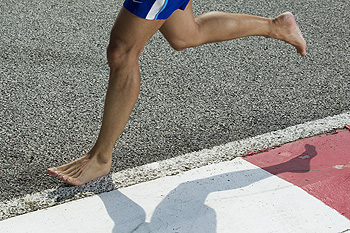Connect With Us
Blog
 Being overweight or obese can put you at risk for a variety of health conditions, but did you know that it can also increase your risk of foot pain? Being overweight or obese puts extra pressure on your feet, potentially leading to strains, sprains, fallen arches, and a host of other foot and ankle problems. Furthermore, being overweight or obese increases your risk of developing diabetes, peripheral neuropathy, and peripheral artery disease, which are all associated with foot health problems, such as diabetic foot ulcers, loss of sensation, and poor circulation. Eating a balanced diet and regularly exercising can improve your overall health. Maintain your daily foot health by wearing padded socks and shoes to avoid injury to the feet, practicing good foot hygiene, and checking your feet regularly for cuts and bruises. Regular visits to a podiatrist can also help spot potential problems and prevent future ones. If you are experiencing foot pain, or want to learn more about what you can do to keep your feet healthy, consult with a podiatrist today.
Being overweight or obese can put you at risk for a variety of health conditions, but did you know that it can also increase your risk of foot pain? Being overweight or obese puts extra pressure on your feet, potentially leading to strains, sprains, fallen arches, and a host of other foot and ankle problems. Furthermore, being overweight or obese increases your risk of developing diabetes, peripheral neuropathy, and peripheral artery disease, which are all associated with foot health problems, such as diabetic foot ulcers, loss of sensation, and poor circulation. Eating a balanced diet and regularly exercising can improve your overall health. Maintain your daily foot health by wearing padded socks and shoes to avoid injury to the feet, practicing good foot hygiene, and checking your feet regularly for cuts and bruises. Regular visits to a podiatrist can also help spot potential problems and prevent future ones. If you are experiencing foot pain, or want to learn more about what you can do to keep your feet healthy, consult with a podiatrist today.
The more you weigh, the harder your feet must work to support your body. If you’re an obese individual and are concerned about your feet, contact Dr. Yeon A. Shim from Roselle Podiatry Group. Our doctor can provide the care you need to keep you pain-free and on your feet.
Obesity and Your Feet
People who are overweight are putting more pressure on their ankles, knees, and hips as well as their feet. This unfortunately can lead to variety of different issues.
Problems & Complications Stemming from Obesity
- When the body is overweight, it tries to compensate by changing the way that it moves. An obese person may lean forward and put extra weight on the wrong part of the foot. This puts unnecessary stress on the feet.
- Obese people are also more likely to develop type II diabetes which is a condition that causes a lot of foot problems. People with diabetes often don’t feel the cuts and sores that they may have on their feet, which can lead to more complicated and severe issues.
- Plantar fasciitis is another foot condition that can be caused by obesity. Plantar fasciitis is an inflammation of the tissue along the bottom of the foot, which causes pain and stiffness while walking and climbing stairs.
If you have any questions, please feel free to contact our office located in Roselle, NJ . We offer the newest diagnostic and treatment technologies for all your foot care needs.
 Foot reconstruction is a type of surgery that is performed to correct the anatomy of the foot and restore proper function. Someone might need reconstructive foot surgery following a major injury to the foot that affects the foot’s soft tissue or bones. Vascular diseases, which can interfere with circulation in the lower limbs, may require surgical intervention. Other issues which can cause deformities include metabolic diseases, such as diabetes and gout, that alter the blood and nerve supply of the foot, and tumors. Finally, birth defects such as clubfoot would also need to be corrected via reconstructive surgery. For more information on reconstructive foot surgery, please consult with a podiatrist.
Foot reconstruction is a type of surgery that is performed to correct the anatomy of the foot and restore proper function. Someone might need reconstructive foot surgery following a major injury to the foot that affects the foot’s soft tissue or bones. Vascular diseases, which can interfere with circulation in the lower limbs, may require surgical intervention. Other issues which can cause deformities include metabolic diseases, such as diabetes and gout, that alter the blood and nerve supply of the foot, and tumors. Finally, birth defects such as clubfoot would also need to be corrected via reconstructive surgery. For more information on reconstructive foot surgery, please consult with a podiatrist.
Foot surgery is sometimes necessary to treat a foot ailment. To learn more, contact Dr. Yeon A. Shim of Roselle Podiatry Group. Our doctor will assist you with all of your foot and ankle needs.
When Is Surgery Necessary?
Foot and ankle surgery is generally reserved for cases in which less invasive, conservative procedures have failed to alleviate the problem. Some of the cases in which surgery may be necessary include:
- Removing foot deformities like bunions and bone spurs
- Severe arthritis that has caused bone issues
- Cosmetic reconstruction
What Types of Surgery Are There?
The type of surgery you receive will depend on the nature of the problem you have. Some of the possible surgeries include:
- Bunionectomy for painful bunions
- Surgical fusion for realignment of bones
- Neuropathy decompression surgery to treat nerve damage
Benefits of Surgery
Although surgery is usually a last resort, it can provide more complete pain relief compared to non-surgical methods and may allow you to finally resume full activity.
Surgical techniques have also become increasingly sophisticated. Techniques like endoscopic surgery allow for smaller incisions and faster recovery times.
If you have any questions please feel free to contact our office located in Roselle, NJ . We offer the newest diagnostic and treatment technologies for all your foot and ankle needs.
 Plantar hyperhidrosis is a medical condition that causes excessively sweaty feet. All of this extra sweat is not only embarrassing, but can also lead to health complications. For example, it may increase your risk of injury due to your feet slipping and sliding in your shoes, or increase your risk of skin infections because of the constant moisture breaking down the skin on your feet. Fortunately, there are several treatments for plantar hyperhidrosis. A podiatrist may prescribe antiperspirants, which block the overactive sweat ducts. Botox injections into the feet, which can temporarily disable sweat glands, are also an effective treatment option. Iontophoresis, in which the feet are submerged in water with an electric current running through it, has been shown to reduce sweating as well. To learn more about plantar hyperhidrosis and to find the right treatment for you, please consult with a podiatrist.
Plantar hyperhidrosis is a medical condition that causes excessively sweaty feet. All of this extra sweat is not only embarrassing, but can also lead to health complications. For example, it may increase your risk of injury due to your feet slipping and sliding in your shoes, or increase your risk of skin infections because of the constant moisture breaking down the skin on your feet. Fortunately, there are several treatments for plantar hyperhidrosis. A podiatrist may prescribe antiperspirants, which block the overactive sweat ducts. Botox injections into the feet, which can temporarily disable sweat glands, are also an effective treatment option. Iontophoresis, in which the feet are submerged in water with an electric current running through it, has been shown to reduce sweating as well. To learn more about plantar hyperhidrosis and to find the right treatment for you, please consult with a podiatrist.
If you are suffering from hyperhidrosis contact Dr. Yeon A. Shim of Roselle Podiatry Group. Our doctor can provide the care you need to attend to all of your foot and ankle needs.
Hyperhidrosis of the Feet
Hyperhidrosis is a rare disorder that can cause people to have excessive sweating of their feet. This can usually occur all on its own without rigorous activity involved. People who suffer from hyperhidrosis may also experience sweaty palms.
Although it is said that sweating is a healthy process meant to cool down the body temperature and to maintain a proper internal temperature, hyperhidrosis may prove to be a huge hindrance on a person’s everyday life.
Plantar hyperhidrosis is considered to be the main form of hyperhidrosis. Secondary hyperhidrosis can refer to sweating that occurs in areas other than the feet or hands and armpits. Often this may be a sign of it being related to another medical condition such as menopause, hyperthyroidism and even Parkinson’s disease.
In order to alleviate this condition, it is important to see your doctor so that they may prescribe the necessary medications so that you can begin to live a normal life again. If this is left untreated, it is said that it will persist throughout an individual’s life.
A last resort approach would be surgery, but it is best to speak with your doctor to find out what may be the best treatment for you.
If you have any questions please feel free to contact our office located in Roselle, NJ . We offer the newest diagnostic and treatment technologies for all your foot and ankle needs.

